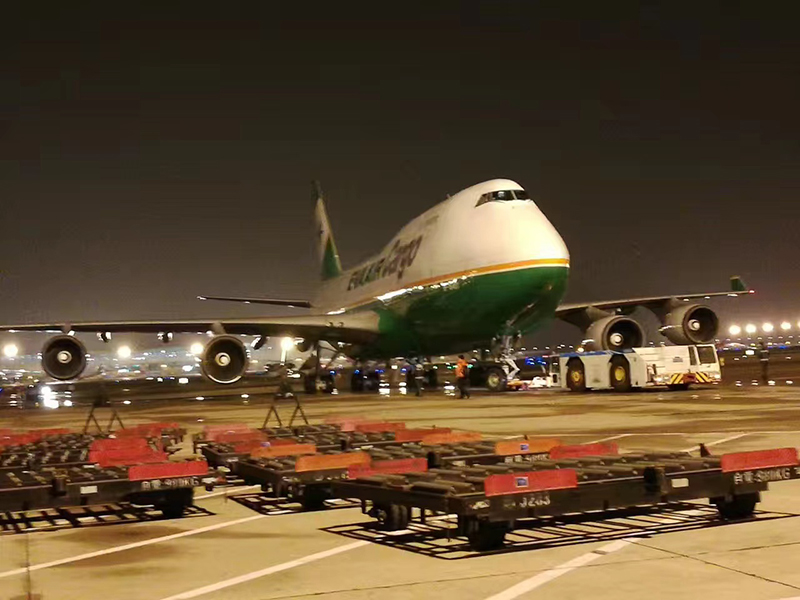The demand by American and European consumers for fast-fashion goods from Chinese e-commerce sites such as Shein and Temu has led to a boom in business for international air freight and logistics companies in Asia, as China reshapes the global online-retail market.
The most popular Chinese fast-fashion brands shipped approximately $155 billion worth of e-commerce goods abroad in the first half of 2023, the Financial Times reported. Fast Air Cargo

Of all air freight cargo, at least 80 percent is believed to come from China's fast-fashion companies on some days, industry publication Supply Chain Dive reported.
Analysts suggest that China's new strategic approach to global online-business trade is shaking up the industry abroad.
Z. John Zhang, a professor of marketing at the Wharton School of the University of Pennsylvania, told China Daily: "[Fast-fashion brands] are successful in the US market for three reasons. First, their prices are lower, helped by a significant extent by zero tariffs that the US is levying on small parcels of less than $800 in value.
"Second, they use intense and over-the-board price promotions that have not been seen in the US market. Finally, both companies rely on low-cost suppliers and designers in China," he said.
To be the fastest and most efficient, the e-commerce sites are reportedly willing to pay elevated prices to air freight carriers to ensure that customers in the US, UK and elsewhere get the goods they have ordered in record time.
In November 2023, a surge in e-commerce cargo from China, including Hong Kong, to the US and Europe pushed worldwide demand up 5 percent compared with November 2022, figures from Xeneta's Clive Data Services showed.
International shoppers are more at ease than ever buying an expensive designer handbag from an online seller on eBay or purchasing a $5 top from Shein. But all will have the expectation that their goods will be delivered to their doorstep in a couple of weeks or less.
In 2022, Shein accounted for one-fifth of the world's fast-fashion market, Reuters reported. Shein serves customers in 150 countries and has 11,000 staff members.
The brand has quickly risen to outpace European stalwarts like H&M, Primark and Zara by appealing to the young, with direct marketing and social media campaigns. Those Western stores, which have had a solid online presence for decades, are considered the pioneers of fast fashion.
The essence of the businesses is that they remake looks from the runways by high fashion houses for less money and sell them to fashion-conscious consumers, especially young, social media-savvy girls.
H&M and Zara also have a large footprint of brick-and-mortar stores worldwide but take longer to identify future fashion trends. They tend to order in larger volumes than China's e-commerce offerings, say analysts.
George Yip, emeritus professor at Imperial College London and distinguished visiting professor at Northeastern University in Boston, said it is "inevitable" that Chinese companies will overtake and dominate the field for several reasons.
"Chinese companies are the fastest in the world at everything they do," Yip told China Daily. "The Chinese managers make decisions quickly. And also, because of that, manufacturing, operating capabilities, they can manufacture quickly.
"The essence of fast fashion is to see what the trend is, then respond to it very quickly in terms of manufacturing and in terms of getting the distribution out," he said.
While supply chain issues are some of the biggest detriments to global trade, China's e-commerce giants have revamped the model of selling overseas by "building a connected supply chain that has the shortest distance between the manufacturer and the final customer" the trade magazine Supply Chain Management Review reported.
Shein strategically changed its headquarters from Nanjing to Shanghai and relies on Guangdong province in South China, a garment manufacturing district in the Pearl River Delta with 25,000 apparel shops.
The Pearl River Delta is famous for generating 40 percent of all Chinese exports. It is near the shipping ports of Yantian and Hong Kong and the airports of Hong Kong and Guangzhou.
That helps Shein take just days to transport goods to a distribution facility to ship them to customers worldwide.
Shein's sales are almost entirely online, which enabled the retailer to generate $23 billion in global revenue in 2022, according to research firm Coresight. The company's overhead is also low, as it doesn't operate any stores full time. Ruthless efficiency is also a key factor.
Yip added: "They now manage much more on digital platforms, which allows for much quicker decision-making; instead of moving up and down the hierarchy, small teams can give the platform access resources and then just launch whatever it is that they want to do."
In the run-up to the Christmas season, data from air freight provider TAC Index showed that rates continued to rise on goods flown transpacific from Hong Kong and Shanghai.
Willie Walsh, director general of the International Air Transport Association (IATA) said: "November air cargo demand was up 8.3 percent on 2022 — the strongest year-on-year growth in almost two years. That is a doubling of October's 3.8 percent increase and a fourth month of positive market development."
Zhang, whose research focuses on pricing strategies, believes that, ultimately, rock-bottom prices and buying trendy fashion in small amounts have been a winning formula for China's fast-fashion brands over Western stalwarts.
"It is the deciding factor: very low prices for highest possible volumes," he said.
Reports: Fast-fashion retailer Shein has filed for IPO in U.S.
Fast-fashion sites grab major share of foreign market

Air Freight For Cars Chinese fast-fashion giants make gains in U.S.